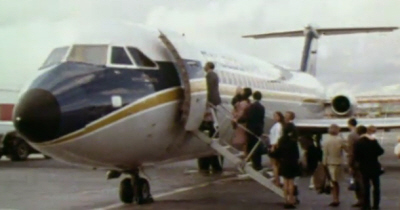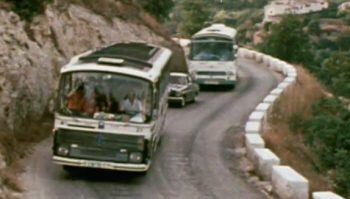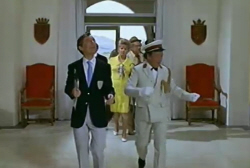The Package Holiday - A 1970s Creation
But the truth was that when you mentioned Europe in the early 70s, most people didn’t think of the grand political project. Europe meant something much simpler and altogether more exciting. A week in the sun. Until the dawn of the 1970s, most British people only crossed the Channel if they were wearing a uniform and carrying a gun. But a foreign holiday was becoming one of those crucial little badges of status and affluence. An adventure abroad was now one of life’s pleasures, an ambition to set beside the manicured lawn, the colour TV and the Ford Cortina. The Package Holiday was born.

By the early 1970s, a two-week package holiday to Spain a one-star hotel would cost you around £20. That’s about £240 today. But the amount of money you could take out of the country was tightly regulated. As late as 1969, you could only take £50 abroad in an entire year.
But in January 1970, the rules were relaxed. Now you could take £300 in foreign currency, and that’s the equivalent of more than £3000 today. It was a small, but seismic, shift.
It was as though British families had been held prisoner in their own country. And now they’d been let out, they behaved like unruly kids on a spending spree.
The Great Costa Getaway

Almost incredibly, Britain’s biggest travel agents, Thomas Cook and Lunn Poly, were both state owned. Like the mines and the railways, package holidays were a nationalised industry. But by 1972, Ted Heath had sold them off to private buyers. In 1970, about 6 million people were already going abroad on holiday. And by the time he left office, four years later, that figure had almost doubled.
That first trip abroad was so often an unforgettable experience. The shock of the heat, the light, and the unfinished hotel. For Ted Heath, Europe meant fine wines, classical music and international brotherhood, but for most British holidaymakers, it meant sheer hedonism. Drunk with the heat, the excitement, and the local liquor, they threw off their inhibitions in a way that would have been simply unthinkable back home in Skegness. This was two weeks of sun, sea, sand, sangria and above all, sex.
Even Britain’s most famous comic brand had tired of the week in the caravan park, and was carrying on, on the Costa.

Back home, the sexual revolution was still something people read about in the newspapers. But now, all those buttoned up inhibitions melted away in the Mediterranean heat.
Español Señors
For girls who were more accustomed to fighting off Barry from Barnsley, sometimes it took just one look from a Spanish waiter and they went weak at the knees. But some girls, rightly, were rather more suspicious of the Latin Lotharios.
As much as people love splashing about in the sun, they still wanted part of it to feel a bit more like home. Most of these visitors were not really interested in exploring Spanish culture, what they wanted was the traditional pleasures of the British seaside, only with added sunshine. That meant a full English breakfast, fish and chips, and steak and kidney pie, all washed down with a cup of PG tips, and a copy of the Daily Mirror.
Educated upper and middle classes have long flocked to the Med for a dose of sunshine and high culture. And to them, the Costa package millions looked like a sun-scorched philistine mob.

Of course, there was a fair bit of social snobbery in all this. Until the 70s, Europe had been a playground for the tiny elite of the rich and well-connected. But this new British tourist was less David Niven, and more David Essex.
But the pioneers of mass-market tourism also wanted a taste of Europe back home. Another sign of a nation impatient for new experiences. Until the 70s, wine was the drink of the refined, or at best, a tipple for special occasions. But with its hints of holiday good times, and its suggestions of sophistication, el vino had invaded the high Street.
Wine was becoming essential at even the most modest suburban dinner party. In just 10 years, the average British wine intake doubled. Indeed, one of the benefits of joining the common market was that it slashed duty on table wine. Of course, it’s easy to look back now and to laugh at all the Blue Nun and Mateus Rosé, but the truth is, that people’s tastes weren’t inherently terrible, they were just untutored because, of course, most people had never drunk wine before. And let’s face it, without these trailblazers and the great British package holiday, you wouldn’t now be sipping that agreeable Sauvignon Blanc.
External Links
Portofino Apartments - Mallorca
